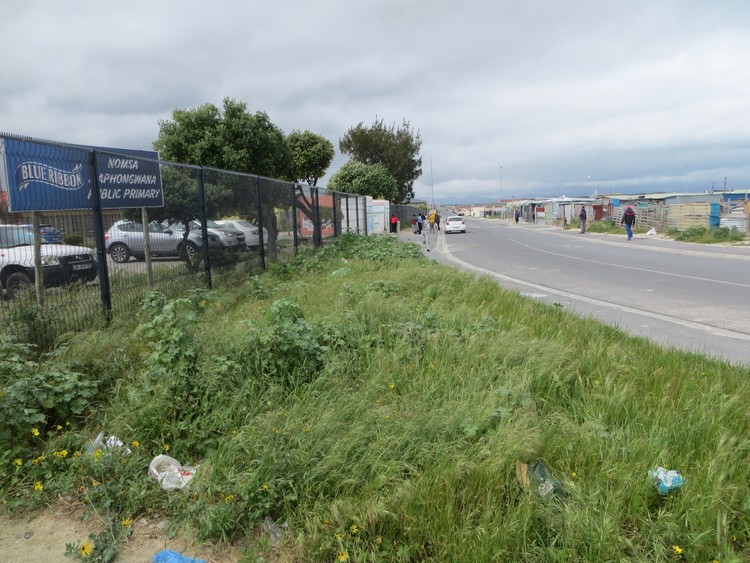Khayelitsha schools battle illegal electricity connections
Electricity theft has left Nomsa Maphongwana Primary School in Mandela Park with a Eskom bill of more than R167,880
Nomsa Maphongwana Primary School in Mandela Park, Khayelitsha, cannot afford to pay its outstanding electricity bill of R167,880. The school has been struggling with illegal connections made by neighbouring shack dwellers. Photo: Vincent Lali
- Staff at a primary school in Mandela Park in Khayelitsha were shocked to discover they owe Eskom more than R167,880 for electricity.
- The school is next to Siyahlala informal settlement which is home to more than 200 families. The shack dwellers have been tapping power from the school.
- In September, Eskom moved the school’s electricity box to inside the grounds to prevent many illegal connections.
- The school now wants Eskom to scrap or reduce their outstanding bill because it cannot afford to pay it.
Staff at Nomsa Maphongwana Primary School in Mandela Park, Khayelitsha are at their wits end after receiving their latest electricity bill.
The school is right next to Siyahlala informal settlement which is home to more than 200 families. According to the deputy principal Loyiso Mkula, their electricity bill for October was R167,880 because people from the informal settlement have been illegally connecting to the school’s electricity line.
“We shared electricity with about 200 families for almost three years. They used electricity recklessly,” said Mkula.
He said the school often goes without electricity due to the number of illegal connections. “Even though we could not access electricity, our bill kept on going up. The school has no money to settle the electricity bill because we are a no-fee school.”
“The school receives funds from the department for textbooks, electricity and water. But the current electricity bill unfortunately exceeds the amount that the department gives us,” he said.
Mkula said each time Eskom officials phone them about the debt, they try explain that their electricity is being stolen by the shack dwellers. “We wish Eskom could cancel our debt or reduce it because we reported the illegal connections immediately.”
Eskom spokesperson Kyle Cookson said Eskom had moved the distribution box to inside the school’s premises on 16 September to try and prevent the illegal connections.
At the neighbouring community of Town Two, Khayelitsha, Chuma Primary school has also been struggling with illegal electricity connections. A teacher at the school, who asked not to be named, told GroundUp the school had gone nine months without power last year.
She said the school was forced to use money designated for maintenance to pay its high electricity bill. “We forked out R2,700 for electricity and paid about R29,000 for rewiring within a week at one stage. The classrooms are dark in the mornings, so we had to wait until it gets light before we start teaching,” she said.
The teacher said they have to go to other schools to make photocopies for classwork and assessments. She said they often miss emails from the provincial education department because they don’t have access to the internet anymore.
“WCED gave us power boosters, which are meant to be used during loadshedding. Now we use them each time our electricity is off because of the illegal connections, but the boosters also need to be charged,” she said.
School Governing Body chairperson Zamuxolo Yekani said shack dwellers in the neighbouring Level Two informal settlement within Town Two run electrical wires next to the school’s fence. “Eskom removes them, but they connect the wires again,” he said.
Level Two community leader Mabhelandile Twani said: “We don’t have electricity. We can only get it from state buildings. Our kids need light in our shacks to do their homework, school assignments and study for exams.”
Twani said illegal connections have helped to reduce shack fires in the settlement. He suggested the Western Cape Education Department (WCED) “must push Eskom to install electricity in the settlement to stop illegal connections”.
WCED spokesperson Bronagh Hammond said illegal connections are a financial and safety risk for these schools.
“Safety risks include the fact that community members are entering the school grounds to set up the illegal connections, often damaging fencing or other infrastructure,” she said.
Hammond said effective law enforcement and cooperation from Eskom was needed to physically fix or prevent illegal connections.
Support independent journalism
Donate using Payfast

Don't miss out on the latest news
We respect your privacy, and promise we won't spam you.
Next: Shack dwellers want sand mining halted
Previous: Lawyers for Human Rights to challenge Tshwane’s eviction of homeless people
© 2023 GroundUp. This article is licensed under a Creative Commons Attribution-NoDerivatives 4.0 International License.
You may republish this article, so long as you credit the authors and GroundUp, and do not change the text. Please include a link back to the original article.
We put an invisible pixel in the article so that we can count traffic to republishers. All analytics tools are solely on our servers. We do not give our logs to any third party. Logs are deleted after two weeks. We do not use any IP address identifying information except to count regional traffic. We are solely interested in counting hits, not tracking users. If you republish, please do not delete the invisible pixel.

